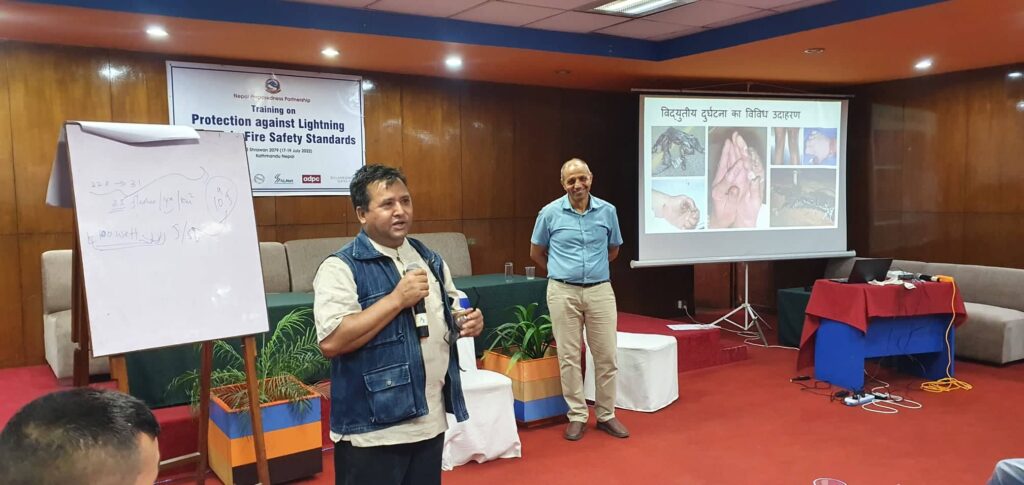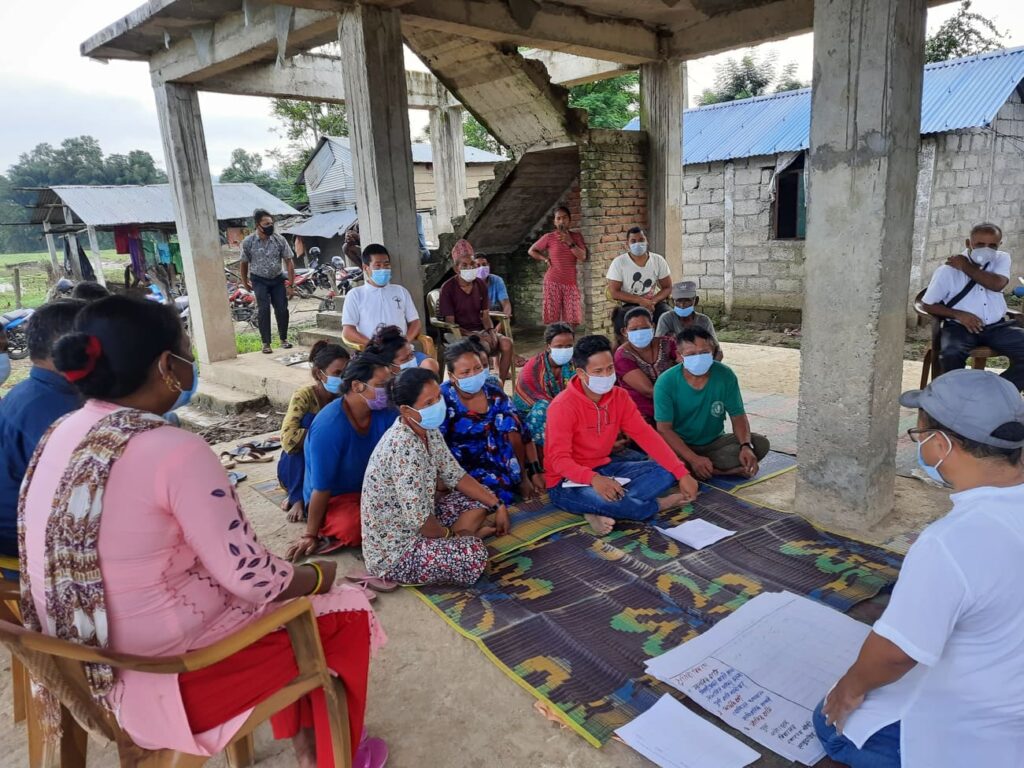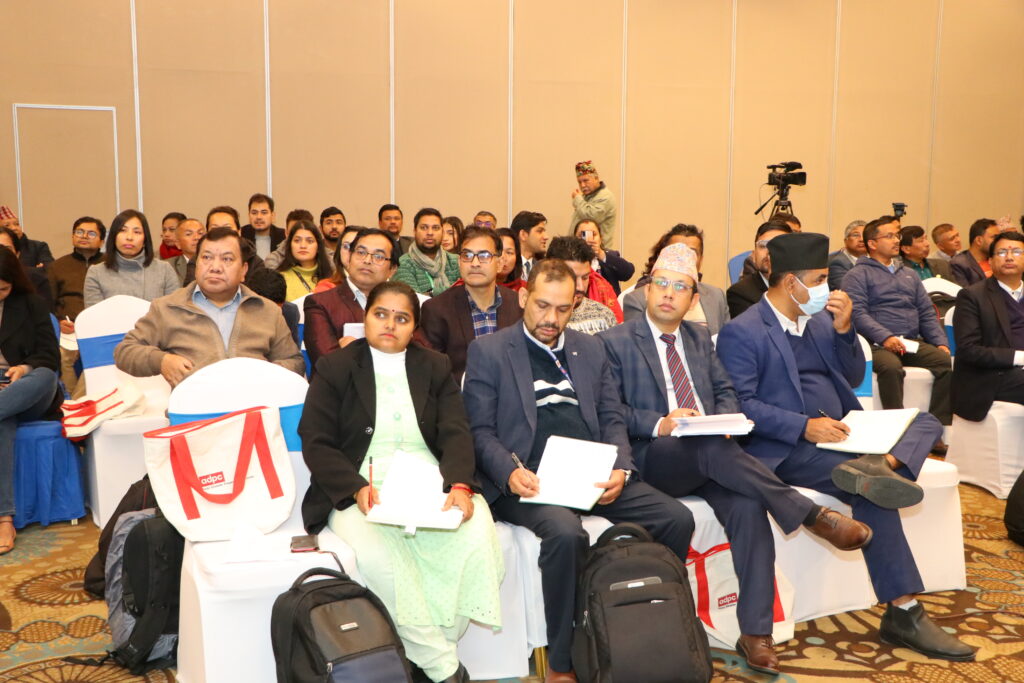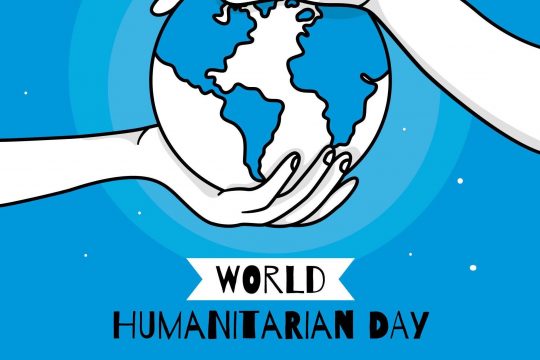Scaling up of Business Continuity Management training
The Nepal Preparedness Partnership (NPP) supports private sector organizations by disseminating skills and knowledge on business continuity management (BCM) through training and utilizing training materials developed by the Asian Disaster Preparedness Center (ADPC). Five training with a total of 200 participants (146 male, 54 female) in 2022. These sessions were conducted in collaboration with various partners and stakeholders including the Ministry of Home Affairs (MOHA), Ministry of Industry, Commerce and Supplies (MoICS), Federation of Nepalese Chambers of Commerce and Industry (FNCCI), United States Agency for International Development’s (USAID) program – Tayar Nepal, and the private sector. The training emphasizes engagement in a comprehensive and systematic risk management approach for businesses to continue smoothly during and after any form of disaster.

Promoting Protection Against Lightning (PaL) and Electric Fire Safety Standards
A three-day national training on PaL and Electric Fire Safety Standards (PaL-EFSS) was organized from 17 – 19 July 2022 following the finalization of training curricula on the matter. The session and materials seek to improve the existing capacities and institutionalize the knowledge and understanding of PaL-EFSS Standards. NPP organized the training with the National Disaster Risk Reduction Centre Nepal (NDRC) and the National Association of Community Electricity Users-Nepal (NACEUN)/SALNet. A total of 42 representatives from the government, international/ national non-governmental organizations (INGOs/ NGOs), academia, the private sector, and media representatives participated in the event. The training instilled in participants the need to prioritize PAL-EFSS which was evident in their interest in similar training within their organizations, communications, and localities.
Supporting Local Level Plan and Policy Development to Support Municipality Officials
Kalika, Khairehini, and Ratnanagar municipalities were selected to develop a Local Disaster and Climate Resilience Plan (LDCRP) under the NPP national steering committee. The plan encompasses municipality-level risk assessment, disaster profile, and priorities activities against assessed local-level risk. It also identifies priorities for municipal sectoral planning to address identified disaster risks. Orientations on disaster risk reduction and management (DRRM) and ward-level risk analysis have been conducted while preparing the LDCRP. Additionally, a two-day training on DRRM and Core Humanitarian Standards (CHS) in the Chitwan district of the Kalika on 7 – 8 August 2022. A total of 60 participants (41 males, 19 females) join the training to improve their understanding of DRRM and CHS and contribute to better planning and implementation of these plans and activities. The Kalika and Ratnanagar plans have been completed and endorsed by respective municipalities while the Khairehini is still in progress.

Localization of Gender and Right-Based Approaches
A roll-out training on Rights-Based and Inclusive Approaches to Early Warning, Evacuation, and Camp Management was conducted in Ratnanagar Municipality of Chitwan district. The training brought together seven municipalities and Nepal Disaster Resilience Network (NDR-Net). The event sought to strengthen the capacity of government representatives and NDR-Net members on gender equality and inclusion and the interlinkages with rights-based approaches with a total of 35 participants (18 male, 17 female). The training implemented the Framework for Integrating Rights and Equality (FIRE) and its six dimensions to ensure rights and equality. In addition, it also aimed to pilot the training manual translated into Nepali language and contextualized through adapting examples, scenarios, and case stories from the country’s national and local context.
Implementing Effective Early Warning Disseminations Strategies
A one-day orientation on Available Weather Forecasts for Effective Early Warning and Dissemination was organized on World Environment Day (5 June 2022) with 35 representatives from the government, INGO/NGOs, media, and municipal authorities. The event was organized in collaboration with the Department of Hydrology and Meteorology, the National Disaster Risk Reduction and Management Authority (NDRRMA), and thematic experts. The main objective of the orientation was to explain the existing early warning message dissemination systems and identify the challenges to accessing, understanding, and capacitating stakeholders to act on the early warning messages. The program is also intended to be a platform that facilitates discussion on improving the effectiveness of the early warning messages amongst municipal officials and the media.

National Conference on Innovation and Enterprises for a Disaster Resilient Nepal
A conference to assemble major innovation centers working in disaster risk management and reduction (DRM/R) and youth entrepreneurs on 13 December 2022. The event sought to provide a more comprehensive overview of the technical need and gap in the field of DRM/R. It also sought to explain the scope, need, and gap in DRM/R innovation and share DRM/R-related innovations in Nepal. There were also discussions to encourage youth entrepreneurs in the private sector to scale up and out DRM-related innovations, potential corporate social responsibility (CSR) allocation, and attracting future investment for disaster risk reduction (DRR) innovation. One of the key takeaways was how to improve future DRM/R priorities that involve youth innovators and the private sector.


